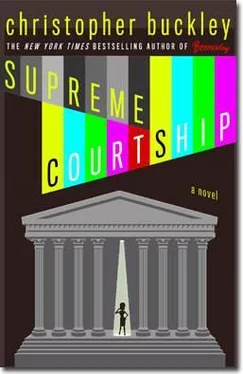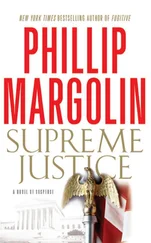“Sir,” Hayden said plunging deeper into gloom, “I’m not sure how he’s going to react to this… whole idea.”
“I wouldn’t worry about that. Graydon’s an old pro. He’ll get it straightaway. And if it goes down in flames, he’ll put the word out, What else could I do? The President asked me to do it as a personal favor. Crafty old badger.”
“Sir, would you consider just meeting with Runningwater?” Hayden said. “I really think you’ll be dazzled by him. His tribe was celebrated for-”
“Hayden,” said the President, “get with the program.”
“Yes, Mr. President.”
IT IS A CLICHÉ in Washington that the most dangerous place to find yourself is between a politician and a TV camera or microphone, but in the case of Senator Dexter Mitchell the cliché had acquired a kind of Darwinian perfection. Dexter Mitchell loved-lived-to talk. He had uttered his first full sentence at the age of fourteen months and hadn’t stopped since.
Once, famously, on his way into a state funeral at the National Cathedral, a reporter for one of the smaller cable TV new channels stepped forward to ask for a brief comment. One hour and fifteen minutes later, Senator Mitchell was still talking as the casket emerged, carried by the honor guard. One of his fellow senators was heard to remark, “Wouldn’t it have been simpler to ask him to deliver the eulogy?” The tape of the interview is a cult classic and plays three or four times a year during the wee hours. Some consider it the best argument around for 24/7 cable TV.
Dexter was now in his midfifties, at the age when men begin to take cholesterol-lowering and penis-elevating medications. Now in his third decade of public service, he had a solid career behind him: prosecutor, congressman, three-term senator from the great state of Connecticut. For the last four years, he had been Chairman of the Senate Judiciary Committee, generally referred to as “the powerful Senate Judiciary Committee.” And true enough: if you wanted to wield a federal gavel, you first had to get past his.
He was good-looking, in a shiny sort of way. He’d had his front teeth capped. They were now so blindingly white that when he bared them, you could almost hear a little tingg! and see a star of light reflect off the incisor, just like in the commercials. He cheerfully admitted to having Botox injections, and even had a nice line about it: “I need all the help I can get. My job involves a lot of frowning.” He had an attractive wife named Terry, attractive children, and an attractive beagle named Amtrak. (Senator Mitchell sat on the Transportation Subcommittee and fought fiercely for subsidies for America ’s railroads, especially the one that ferried him from Stamford to Washington and back.)
If a computer were programmed to design a president of the United States, it might very well generate Dexter Mitchell. Everything about him seemed, indeed, calculated. And yet for all his qualifications, Dexter somehow added up to less than the sum of his considerable parts. His epic loquacity was not an asset. Successive campaign advisers had tried without success to get him to give briefer answers, but nothing had stemmed the logorrheic tide, the tsunami of subordinate clauses and parenthetical asides, the inexorable mudslide of anecdotage. His campaign “listening tours” were occasions of mirth among political reporters, since it was the people he met who did the listening. Dexter Mitchell would happily express himself on any issue, at any time, at any place.
He had run for president three times. The first time, he raised $12 million and came in third in the Iowa caucus. [3]The second time, he raised $20 million and came in fourth. The third time, he raised $22 million and came in seventh. He was undeterred. Somewhere over the rainbow he heard the people chanting, Mit-chell! Mit-chell! But by now he had begun to acquire a slightly used feel; “certifiably preowned,” as one pundit put it uncharitably.
When he declared his intention to run a fourth time, his wife, now working as a K Street lobbyist representing-as it happened-the U.S. rail industry, replied in no uncertain terms that she would not spend one more weekend, one more day, one more hour, one more minute at some coffee shop in Iowa, pretending to care about ethanol, or indeed any biofuel; or for that matter about the price of wheat, corn, soy, or anything that emerged from the loamy topsoil of the Hawkeye State. Dexter sulked off to the World Economic Forum in Davos, Switzerland, to drown his sorrow in feverish multilateral panel discussions on climate change and globalization.
Contemplating his thwarted presidential ambition, Dexter decided that a more sensible-and permanent-avenue to greatness would be to become a justice of the U.S. Supreme Court. And why shouldn’t he? He was ideal for the job. In fact, he asked himself, why hadn’t he thought of it sooner? He berated his friends for not having thought of it first.
It was this conviction, along with a refreshing absence of modesty, that had prompted him to call Hayden Cork some months before and request an Oval Office meeting with the President. He gave an equivocal reason, saying only that it was “important and confidential.” The President groaned at the prospect, but agreed.
On arriving, Dexter plunked himself down and said to the President (we know all this from a tape recording in the archives at the Vanderdamp Library): “My information is that Brinnin’s gone nuttier than a granola bar. You and I haven’t always seen eye to eye, but I’ve always respected you.” (Three weeks before, Dexter had called President Vanderdamp “the worst president since Warren G. Harding.”) “But I say let’s put aside whatever philosophical disagreements we have. I’d like you to consider putting my name forward as a successor to Brinnin.”
There is a brief, perhaps eloquent, silence on the tape. Then Dexter continues: “Now, why do I propose myself? Frankly, because I think I’m the right person for the job. Why do I think that? I’ve narrowed it down to five reasons. Well, six. Don-if I may-when I first started practicing law over three decades ago…”
The tape continues on for twenty-six minutes. In the background, you can hear the President reaching for an imaginary-and much craved-EJECT button. At several points he tries to arrest the wall of sound with comments like, “I promise to give it the consideration it deserves.” But Mitchell, having only gotten as far as reason number three (paragraph four), soldiers on.
Eventually, a door opens and an aide advises the President that his next meeting is now imminent (an almost certain lie). Vanderdamp’s exhalation after the door has closed on his loquacious visitor is reminiscent of a man who has at long last reached a desperately sought urinal.
The President did not nominate Dexter Mitchell to succeed Justice Brinnin, for at least five reasons. When Cooney’s nomination was released to the press, the President told Hayden Cork to leak it that Mitchell’s name had not been on the short list-or even on the long list. (The ever-protective Hayden wisely ignored the instruction.) Mitchell was thus, to put it mildly, undisposed to treat the President’s nominees kindly. Nor did he. After wiping Cooney’s and Burrows’s blood and brain matter from his gavel, he smiled and said-with uncharacteristic concision-“Next?”
It was just after four o’clock on Monday, which gave Pepper less than an hour to give the President her answer.
The day’s taping had gone well. Buddy was in a good mood. She was summoning the courage to introduce the dreaded topic when he said, “You given any more thought to my idea?”
“What idea, sug?” she said.
“The prison,” he said excitedly, as if suggesting they hop on the next flight to Paris.
Читать дальше











